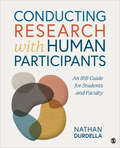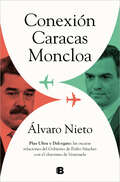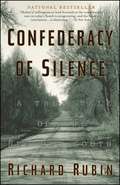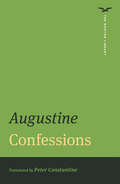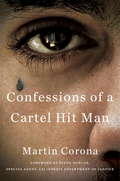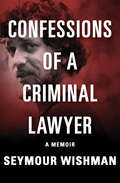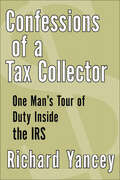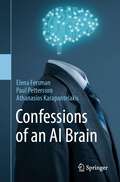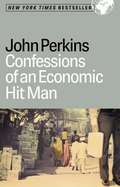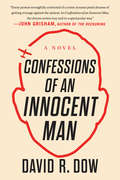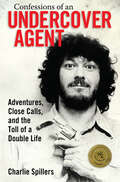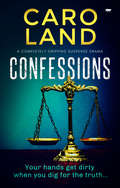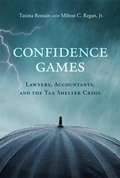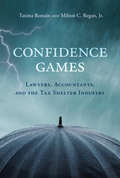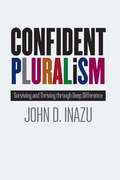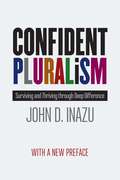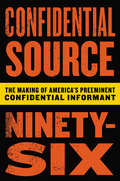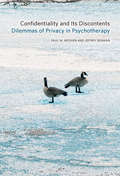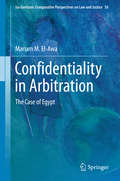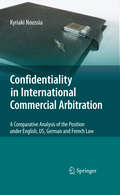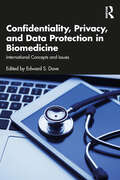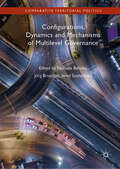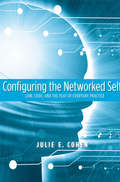- Table View
- List View
Conducting Research with Human Participants: An IRB Guide for Students and Faculty
by Nathan Richard DurdellaConducting Research with Human Participants: An IRB Guide for Students and Faculty by Nathan Durdella is the only guidebook students and faculty will need to navigate the IRB process and secure swift approval of research protocols. This book serves as an advisor to walk researchers through all the details of drafting, submission, and revision of materials for Institutional Review Boards so they can complete their research projects or dissertations faster. This text walks readers through the history of Institutional Review Boards, the contemporary context of ethical research, strategies to effectively draft, submit, and revise an IRB protocol, and guidance on working with an approved protocol in the field. The latest updates to the Common Rule and other regulatory frameworks, including special protections for working with vulnerable groups, are covered throughout the text. Not every research project goes according to plan, so adverse events and reporting receive special coverage. A final chapter on ethical research practices beyond IRB compliance encourages researchers to think through how to exit the field of research and ensure their research benefits the individuals, families, and communities in which they work. Take the guesswork out of the IRB process from start to finish with this handy guide.
Conducting Research with Human Participants: An IRB Guide for Students and Faculty
by Nathan Richard DurdellaConducting Research with Human Participants: An IRB Guide for Students and Faculty by Nathan Durdella is the only guidebook students and faculty will need to navigate the IRB process and secure swift approval of research protocols. This book serves as an advisor to walk researchers through all the details of drafting, submission, and revision of materials for Institutional Review Boards so they can complete their research projects or dissertations faster. This text walks readers through the history of Institutional Review Boards, the contemporary context of ethical research, strategies to effectively draft, submit, and revise an IRB protocol, and guidance on working with an approved protocol in the field. The latest updates to the Common Rule and other regulatory frameworks, including special protections for working with vulnerable groups, are covered throughout the text. Not every research project goes according to plan, so adverse events and reporting receive special coverage. A final chapter on ethical research practices beyond IRB compliance encourages researchers to think through how to exit the field of research and ensure their research benefits the individuals, families, and communities in which they work. Take the guesswork out of the IRB process from start to finish with this handy guide.
Conexión Caracas-Moncloa: Plus Ultra y Delcygate: las oscuras relaciones del Gobierno de Pedro Sánchez con el chavismo de Venezuela
by Álvaro NietoConexión Caracas-Moncloa es un libro trepidante que nos abre las puertas a las intrigas de las más altas esferas del poder, exponiendo una política de componendas, traiciones y mentiras. ¿Qué relaciones existen entre el Gobierno de Pedro Sánchez y el chavismo de Venezuela? ¿Por qué el entonces ministro José Luis Ábalos se reunió en Barajas con la vicepresidenta de Venezuela pese a la prohibición de entrada en la Unión Europea? ¿Y por qué el Gobierno de coalición quiso salvar una aerolínea como Plus Ultra cuyos vínculos con el chavismo eran incuestionables? Los dos principales escándalos del Gobierno de Pedro Sánchez, el Delcygate -el día en que Delcy Rodríguez, la número dos de Maduro, aterrizó en España- y el Plus Ultra -el rescate millonario a esta aerolínea-, tienen en común mucho más que los aviones que los protagonizan. En ambos juega un papel determinante Venezuela, dejando al descubierto las históricas y controvertidas relaciones entre el régimen chavista y los dos partidos que integran el Ejecutivo español, PSOE y Podemos. Álvaro Nieto, el periodista que lideró el equipo que destapó ambos escándalos, cuenta en este libro todos los detalles sobre cómo se gestaron, sus extraños vínculos y las consecuencias que podrían tener para algunos miembros del Gobierno.
Confederacy of Silence: A True Tale of the New Old South
by Richard RubinDiscussion of the New South by a news correspondent on a Southern paper.
Confederacy of Silence: A True Tale of the New Old South
by Richard RubinIn this stunning twist on the timeless tale of an outsider fascinated by a closed society, a young Jewish writer goes back to Greenwood, Mississippi, where he had his first newspaper job, and covers a murder trial that challenges his notions of both the South and himself.When Richard Rubin, fresh out of the Ivy League, accepts a job at a daily newspaper in the old Delta town of Greenwood, Mississippi, he is thrust into a place as different from his hometown of New York as any in the country. Yet to his surprise, he is warmly welcomed by the townspeople and soon finds his first great scoop in Handy Campbell, a poor, black teen and gifted high school quarterback who goes on to win a spot on Mississippi State's team—a training ground for the NFL. Six years later, Rubin, back in New York, learns that Handy is locked up in Greenwood, accused of capital murder. Returning south to cover the trial, Rubin follows the trail that took Handy from the football field to county jail. As the best and worst elements of Mississippi rise up to do battle over one man's fate, Rubin must confront his own unresolved feelings about the confederacy of silence that initially enabled him to thrive in Greenwood but ultimately forced him to leave it.
Confessions (The Norton Library #0)
by AugustineAbout Peter Constantine’s translation “There are times when Augustine seems all too self-consciously in control of his performance, but there are moments when the role of penitent sinner turned ecstatic worshipper ceases to be a role and becomes simply the naked truth of the man himself. The deep strength of Peter Constantine’s translation is that he has matched Augustine’s sincerity with his own.” —JACK MILES, author of God: A Biography
Confessions of a Cartel Hit Man
by Tony Rafael Martin CoronaThe true confession of an assassin, a sicario, who rose through the ranks of the Southern California gang world to become a respected leader in an elite, cruelly efficient crew of hit men for Mexico's "most vicious drug cartel," and eventually found a way out and an (almost) normal life. Martin Corona, a US citizen, fell into the outlaw life at twelve and worked for a crew run by the Arellano brothers, founders of the the Tijuana drug cartel that dominated the Southern California drug trade and much bloody gang warfare for decades. Corona's crew would cross into the United States from their luxurious hideout in Mexico, kill whoever needed to be killed north of the border, and return home in the afternoon. That work continued until the arrest of Javier Arellano-Félix in 2006 in a huge coordinated DEA operation. Martin Corona played a key role in the downfall of the cartel when he turned state's evidence. He confessed to multiple murders. Special Agent of the California Department of Justice Steve Duncan, who wrote the foreword, says Martin Corona is the only former cartel hit man he knows who is truly remorseful. Martin's father was a US Marine. The family had many solid middle-class advantages, including the good fortune to be posted in Hawaii for a time during which a teenage Martin thought he might be able to turn away from the outlaw life of theft, drug dealing, gun play, and prostitution. He briefly quit drugs and held down a job, but a die had been cast. He soon returned to a gangbanging life he now deeply regrets. How does someone become evil, a murderer who can kill without hesitation? This story is an insight into how it happened to one human being and how he now lives with himself. He is no longer a killer; he has asked for forgiveness; he has made a kind of peace for himself. He wrote letters to family members of his victims. Some of them not only wrote back but came to support him at his parole hearings. It is a cautionary tale, but also one that shows that evil doesn't have to be forever.
Confessions of a Criminal Lawyer: A Memoir
by Seymour WishmanA successful former defense attorney exposes the raw truth about the courtroom &“game&” and a career spent defending the guiltyAs an advocate for the accused in Newark, New Jersey, criminal lawyer Seymour Wishman defended a vast array of clients, from burglars and thieves to rapists and murderers. Many of them were poor and undereducated, and nearly all of them were guilty. But it was not Wishman&’s duty to pass moral judgment on those he represented. His job was to convince a jury to set his clients free or, at the very least, to impose the most lenient punishment permissible by law. And he was very good at his job. Reveling in the adrenaline rush of &“winning,&” Wishman gave no thought to the ethical considerations of his daily dealings . . . until he was confronted on the street by a rape victim he had humiliated in the courtroom. A fascinating, no-holds-barred memoir of his years spent as &“attorney for the damned,&” Wishman&’s Confessions of a Criminal Lawyer is a startling and important work—an eye-opening, thought-provoking examination of how the justice system works and how it should work—by an attorney who both defended and prosecuted those accused of the most horrific crimes.
Confessions of a Tax Collector: One Man's Tour of Duty Inside the IRS
by Richard YanceyTwelve years ago, Richard Yancey answered a blind ad in the newspaper offering a salary higher than what he’d made over the three previous years combined. It turned out that the job was for the Internal Revenue Service -- the most hated and feared organization in the federal government.So Yancey became the man who got in his car, drove to your house, knocked on your door, and made you pay. Never mind that his car was littered with candy wrappers, his palms were sweaty, and he couldn’t remember where he stashed his own tax records. He was there on the authority of the United States government.With "a rich mix of humor, horror, and angst [and] better than most novels on the bestseller lists" (Boston Sunday Globe), Confessions of a Tax Collector contains an astonishing cast of too-strange-for-fiction characters. But the most intriguing character of all is Yancey himself who -- in detailing how the job changed him and how he managed to pull himself back from the brink of moral, ethical, and spiritual bankruptcy -- reveals what really lies beneath those dark suits and mirrored sunglasses.This P.S. edition features an extra 16 pages of insights into the book, including author interviews, recommended reading, and more.
Confessions of an AI Brain
by Paul Pettersson Elena Fersman Athanasios KarapantelakisHave you thought of how it feels to be an AI brain in the world of humans? This book allows such a brain to tell us how it takes on its mission of helping humans to develop a more efficient, sustainable, diverse and inclusive society.This book explains the principles and applications of artificial intelligence for a broad audience. Artificial intelligence, as part of computer science, is often inspired by human intelligence. At the same time, there is still reluctance in the applications and usability of artificial intelligence among citizens. Industries are deploying AI in their products and processes but the level of maturity is varying. The book is written as a first person narrative, from an AI perspective, having the AI brain tell the story.
Confessions of an Economic Hit Man
by John PerkinsThis is the story of John Perkins and his involvement in the behind the scenes business and political work as U.S corporations have attempted to dominate and control the world economy. This story crosses many administrations and how John was involved in major policies since 1970. These are his experiences and he reveals the underhanded ways we have taken over many national economies world wide.
Confessions of an Innocent Man: A Novel
by David R. Dow“Every person wrongfully convicted of a crime at some point dreams of getting revenge against the system. In Confessions of an Innocent Man, the dream comes true and in a spectacular way.”—John Grisham, New York Times bestselling author of The Reckoning A thrillingly suspenseful debut novel, and a fierce howl of rage that questions the true meaning of justice.Rafael Zhettah relishes the simplicity and freedom of his life. He is the owner and head chef of a promising Houston restaurant. A pilot with open access to the boundless Texas horizon. A bachelor, content with having few personal or material attachments that ground him. Then, lightning strikes. When he finds Tieresse—billionaire, philanthropist, sophisticate, bombshell—sitting at one of his tables, he also finds his soul mate and his life starts again. And just as fast, when she is brutally murdered in their home, when he is convicted of the crime, when he is sentenced to die, it is all ripped away. But for Rafael Zhettah, death row is not the end. It is only the beginning. Now, with his recaptured freedom, he will stop at nothing to deliver justice to those who stole everything from him. This is a heart-stoppingly suspenseful, devastating, page-turning debut novel. A thriller with a relentless grip that wants you to read it in one sitting. David R. Dow has dedicated his life to the fight against capital punishment—to righting the horrific injustices of the death penalty regime in Texas. He delivers the perfect modern parable for exploring our complex, uneasy relationships with punishment and reparation in a terribly unjust world.
Confessions of an Undercover Agent: Adventures, Close Calls, and the Toll of a Double Life (Willie Morris Books in Memoir and Biography)
by Charlie SpillersThis true story of an ex-Marine who fought crime as an undercover cop, a narcotics agent, and finally a federal prosecutor spans a decade of crime fighting and narrow escapes. Charlie Spillers dealt with a remarkable variety of career criminals, including heroin traffickers, safecrackers, burglars, auto thieves, and members of Mafia and Mexican drug smuggling operations. In this riveting tale, the author recounts fascinating experiences and the creative methods he used to succeed and survive in a difficult and sometimes extremely dangerous underworld life.As a young officer with the Baton Rouge Police Department, ex-Marine Charlie Spillers first went undercover to infiltrate criminal groups to gather intelligence. Working alone and often unarmed, he constantly attempted to walk the thin line between triumph and disaster. When on the hunt, his closest associates were safecrackers, prostitutes, and burglars. His abilities propelled him into years of undercover work inside drug trafficking rings. But the longer he worked, the greater the risks. His final and perhaps most significant action in Baton Rouge was leading a battle against corruption in the police department itself.After Baton Rouge, he joined the Mississippi Bureau of Narcotics and for the next five years continued working undercover, from the Gulf Coast to Memphis; and from New Orleans to Houston, Texas. He capped off a unique career by becoming a federal prosecutor and the justice attaché for Iraq. In this book, he shares his most intriguing exploits and exciting undercover stings, putting readers in the middle of the action.
Confessions: A Completely Gripping Suspense Drama (The Natalie Bach Novels #2)
by Caro LandA brilliant new drama by bestselling author Caroline England, writing as Caro Land. Dig for the truth and you’ll get dirty… Natalie Bach is facing personal turmoil, legal conundrums and challenges. While trying to make a difference, she walks the fine line between being a help and a hinderance. Seconded to criminal law firm, Savage Solicitors, Nat finds herself out of her depth when she’s handed a complicated and tragic case of assisted suicide. Will she get to the bottom of what really happened? With a heavy workload to juggle, can Nat untangle her own feelings from another very personal and troubling investigation? What readers are saying about Confessions: 'Another magnificent tale starring solicitor, detective and lover, Natalie Bach. Warm, observational and compelling.’ Amanda Robson, bestselling author of Obsession 'I loved this book - fabulous, fun yet really gripping.’ C J Cooper, author of The Book Club Confessions is the second book in a gripping new legal, crime suspense series written by bestselling author Caroline England, writing as Caro Land, though can equally be read as an unmissable stand-alone. It will appeal to fans of authors like Diane Jeffrey, Samantha Hayes and K.L. Slater as well as readers of women's fiction.
Confidence Games
by Milton C. Regan Jr. Tanina RostainFor ten boom-powered years at the turn of the twenty-first century, some of America's most prominent law and accounting firms created and marketed products that enabled the very rich -- including newly minted dot-com millionaires -- to avoid paying their fair share of taxes by claiming benefits not recognized by law. These abusive domestic tax shelters bore such exotic names as BOSS, BLIPS, and COBRA and were developed by such prestigious firms as KPMG and Ernst & Young. They brought in hundreds of millions of dollars in fees from clients and bilked the U.S. Treasury of billions in revenues before the IRS and Justice Department stepped in with civil penalties and criminal prosecutions. In Confidence Games, Tanina Rostain and Milton Regan describe the rise and fall of the tax shelter industry during this period, offering a riveting account of the most serious episode of professional misconduct in the history of the American bar. Rostain and Regan describe a beleaguered IRS preoccupied by attacks from antitax and antigovernment politicians; heightened competition for professional services; the relaxation of tax practitioner norms against aggressive advice; and the creation of complex financial instruments that made abusive shelters harder to detect. By 2004, the tax shelter boom was over, leaving failed firms, disgraced professionals, and prison sentences in its wake. Rostain and Regan's cautionary tale remains highly relevant today, as lawyers and accountants continue to face intense competitive pressure and regulators still struggle to keep pace with accelerating financial risk and innovation.
Confidence Games: Lawyers, Accountants, and the Tax Shelter Industry (The\mit Press Ser.)
by Tanina Rostain Milton C. ReganThe rise and fall of a tax shelter industry that enabled some of America's richest citizens to avoid paying their fair share of taxes.For ten boom-powered years at the turn of the twenty-first century, some of America's most prominent law and accounting firms created and marketed products that enabled the very rich—including newly minted dot-com millionaires—to avoid paying their fair share of taxes by claiming benefits not recognized by law. These abusive domestic tax shelters bore such exotic names as BOSS, BLIPS, and COBRA and were developed by such prestigious firms as KPMG and Ernst & Young. They brought in hundreds of millions of dollars in fees from clients and bilked the U.S. Treasury of billions in revenues before the IRS and Justice Department stepped in with civil penalties and criminal prosecutions. In Confidence Games, Tanina Rostain and Milton Regan describe the rise and fall of the tax shelter industry during this period, offering a riveting account of the most serious episode of professional misconduct in the history of the American bar.Rostain and Regan describe a beleaguered IRS preoccupied by attacks from antitax and antigovernment politicians; heightened competition for professional services; the relaxation of tax practitioner norms against aggressive advice; and the creation of complex financial instruments that made abusive shelters harder to detect. By 2004, the tax shelter boom was over, leaving failed firms, disgraced professionals, and prison sentences in its wake. Rostain and Regan's cautionary tale remains highly relevant today, as lawyers and accountants continue to face intense competitive pressure and regulators still struggle to keep pace with accelerating financial risk and innovation.
Confident Pluralism: Surviving and Thriving through Deep Difference
by John D. InazuIn recent years, the United States has become increasingly polarized and divided. This fissure is evident across the nation in conflict over LGBTQ rights; in challenges to religious liberty; in clashes over abortion; in tensions between law enforcement and minority communities. With all of this physical and emotional violence enacted by our legal system and such seemingly irresolvable differences in beliefs, values, and identities across the country, we are forced to ask--how can the people of this nation ever live in peace together? In Confident Pluralism, John D. Inazu analyzes the current state of the country, orients the contemporary United States within its broader history, and explores the ways that Americans can--and must--live together peaceably despite these deeply engrained differences. Pluralism is one of the founding creeds of the United States--yet America's society and legal system continues to face deep, unsolved structural problems in dealing with differing cultural anxieties, and minority viewpoints. Inazu not only argues that it is possible to cohabitate peacefully in this country, but also lays out realistic guidelines for our society and legal system to achieve the new American dream through civic practices that value toleration over protest, humility over defensiveness, and persuasion over coercion. An essential clarion call during one of the most troubled times in US history, Confident Pluralism offers a refreshing argument for how the legal system can protect peoples' personal beliefs and differences and shows how we can build toward a healthier future of tolerance, patience, and empathy.
Confident Pluralism: Surviving and Thriving through Deep Difference
by John D. InazuIn the three years since Donald Trump first announced his plans to run for president, the United States seems to become more dramatically polarized and divided with each passing month. There are seemingly irresolvable differences in the beliefs, values, and identities of citizens across the country that too often play out in our legal system in clashes on a range of topics such as the tensions between law enforcement and minority communities. How can we possibly argue for civic aspirations like tolerance, humility, and patience in our current moment? In Confident Pluralism, John D. Inazu analyzes the current state of the country, orients the contemporary United States within its broader history, and explores the ways that Americans can—and must—strive to live together peaceably despite our deeply engrained differences. Pluralism is one of the founding creeds of the United States—yet America’s society and legal system continues to face deep, unsolved structural problems in dealing with differing cultural anxieties and differing viewpoints. Inazu not only argues that it is possible to cohabitate peacefully in this country, but also lays out realistic guidelines for our society and legal system to achieve the new American dream through civic practices that value toleration over protest, humility over defensiveness, and persuasion over coercion. With a new preface that addresses the election of Donald Trump, the decline in civic discourse after the election, the Nazi march in Charlottesville, and more, this new edition of Confident Pluralism is an essential clarion call during one of the most troubled times in US history. Inazu argues for institutions that can work to bring people together as well as political institutions that will defend the unprotected. Confident Pluralism offers a refreshing argument for how the legal system can protect peoples’ personal beliefs and differences and provides a path forward to a healthier future of tolerance, humility, and patience.
Confidential Source Ninety-Six: The Making Of America's Preeminent Confidential Informant
by C. S. 96A HARROWING JOURNEY INSIDE THE HIDDEN WORLD OF DRUG CARTELS BY ONE OF THE TOP CRIMINAL INFORMANTS IN U.S. LAW ENFORCEMENT HISTORY.The men he put behind bars know him as Roman Caribe or one of the dozens of other aliases he has used undercover. His handlers in the DEA, ICE, and FBI know him as Confidential Source Ninety-Six, or C.S. 96, named for the year he confronted the sins of his life atop a massive drug distribution ring and flipped, becoming law enforcement's secret weapon. In Confidential Source Ninety-Six, Caribe tells the extraordinary story of his transformation into America's most successful informant in terms of total narcotics seized--from the years of trafficking cocaine and marijuana across the U.S. for a terrifying drug lord, eventually becoming that man's number two, to his decision to defect and trade sides. In his first mission, Caribe set his sights on his onetime boss's brutal operation. In his next, he broke all protocol and made a daring foray into the notorious Fuentes Cartel, where he took down a family that was smuggling tons of drugs across the U.S.-Mexico border.As Caribe launched his career as a confidential source, finding his faith and seeking to finally do right by his stoic wife, Inez, and his four children, his marriage became stressed in new ways, the risks to his family unimaginable if he made a single mistake on the job. He found himself looking over his shoulder every day, knowing that with each drug ring or kingpin he destroyed, he made another dangerous enemy. For as long as he continued the high stakes work, he would survive on the cunning of his tradecraft and his ability to improvise in the most terrifying circumstances. Unfolding in Southern California mansions, makeshift DEA trailers deep in the redwood forest, drug fronts in Spanish Harlem, fast-food parking lots where kilograms of cocaine and heroin change hands, and around the dinner table where Caribe began mentoring at-risk youth to help them avoid the mistakes he made, Confidential Source Ninety-Six is the epic saga of one man's quest to redeem himself and a thrilling look at the law enforcement battle that rages in the shadows of our nation.
Confidentiality and Its Discontents: Dilemmas of Privacy in Psychotherapy (Psychoanalytic Interventions)
by Paul W. Mosher Jeffrey BermanFreud promised his patients absolute confidentiality, regardless of what they revealed, but privacy in psychotherapy began to erode a half-century ago. Psychotherapists now seem to serve as “double agents” with a dual and often conflicting allegiance to patient and society. Some therapists even go so far as to issue Miranda-type warnings, advising patients that what they say in therapy may be used against them.Confidentiality and Its Discontents explores the human stories arising from this loss of confidentiality in psychotherapy. Addressing different types of psychotherapy breaches, Mosher and Berman begin with the the story of novelist Philip Roth, who was horrified when he learned that his psychoanalyst had written a thinly veiled case study about him. Other breaches of privacy occur when the so-called duty to protect compels a therapist to break confidentiality by contacting the police. Every psychotherapist has heard about “Tarasoff,” but few know the details of this story of fatal attraction. Nor are most readers familiar with the Jaffee case, which established psychotherapist-patient privilege in the federal courts. Similiarly, the story of Robert Bierenbaum, a New York surgeon who was brought to justice fifteen years after he brutally murdered his wife, reveals how privileged communication became established in a state court. Meanwhile, the story of New York Chief Judge Sol Wachtler, convicted of harassing a former lover and her daughter, shows how the fear of the loss of confidentiality may prevent a person from seeking treatment, with potentially disastrous results.While affirming the importance of the psychotherapist-patient privilege, Confidentiality and Its Discontents focuses on both the inner and outer stories of the characters involved in noteworthy psychotherapy breaches and the ways in which psychiatry and the law can complement but sometimes clash with each other.
Confidentiality in Arbitration: The Case of Egypt (Ius Gentium: Comparative Perspectives on Law and Justice #56)
by Mariam M. M. El-AwaThis book addresses the issue of privacy and confidentiality in the broader context of the Egyptian legal system. The volume opens with an overview of the major approaches to confidentiality adopted in various jurisdictions. It goes on to examine the duties of confidentiality and privacy in arbitration law and practice on the basis of interviews with 30 law professors and practitioners who often act as arbitrators or counsel for parties in arbitral disputes together with the relevant Egyptian arbitration law provisions. The book takes into account the relevant provisions in the arbitration laws of Syria, Saudia Arabia and Yemen. It moves on to explore the relation between arbitration and the judicial system, and the extent to which the former should borrow its rules from the latter with regard to publicity and the rule of public trial. Finally, this book looks at the right to privacy as (a) a constitutional right, as a potential basis for a legal duty of confidentiality in arbitration, and the duties stemming from this constitutional right in the various laws of Egypt, as well as (b) the constraints imposed on the right to privacy, in particular those stemming from the constitutional principles of freedom of speech and freedom of the press. The main conclusion is that confidentiality does indeed exist in arbitration. However, its legal basis is not the law on arbitration or the arbitration agreement. It is in fact a corollary of the fundamental right to privacy granted in the Egyptian legal system to both natural and legal persons.
Confidentiality in International Commercial Arbitration: A Comparative Analysis of the Position under English, US, German and French Law
by Kyriaki NoussiaArbitration is an essential component in business. In an age when transparency is a maxim, important issues which the laws governing arbitration currently fail to address are the extent to which disclosure of information can be constrained by private agreement along with the extent to which the duty to preserve confidentiality can be stretched. Absent a coherent legal framework and extensive qualitative and quantitative data, it is equally difficult to suggest and predict future directions. This book offers a tool for attaining centralised access to otherwise fragmentary and dispersed material, as well as a comprehensive analysis and detailed exposition of the position in relation to confidentiality in arbitration in the jurisdictions of England, USA, France and Germany.
Confidentiality, Privacy, and Data Protection in Biomedicine: International Concepts and Issues
by Edward S. DoveFeaturing contributions from leading scholars of health privacy law, this important volume offers insightful reflection on issues such as confidentiality, privacy, and data protection, as well as analysis in how a range of jurisdictions—including the US, the UK, Europe, South Africa, and Australia—navigate a rapidly developing biomedical environment.While the collection of personal health information offers the potential to drive research and innovation, it also generates complex legal and ethical questions in how this information is used to ensure the rights and interests of individuals and communities are respected. But in many ways laws have struggled to keep pace with technological developments. This book therefore seeks to fill a lacuna for legal insight and reflection. Over three parts, the book first explores the conceptual landscape which law and legal institutions must contend, and then turns to examine practical issues such as the GDPR, secondary use of data for research, genomic research, and data trusts.With cutting-edge analysis drawing on domestic and international case law, legislation, and policy, this comprehensive volume will prove fascinating reading for all students and researchers interested in this evolving and contentious area of study.
Configurations, Dynamics and Mechanisms of Multilevel Governance (Comparative Territorial Politics)
by Jared Sonnicksen Nathalie Behnke Jörg BroschekThis edited volume provides a comprehensive overview of the diverse and multi-faceted research on governance in multilevel systems. The book features a collection of cutting-edge trans-Atlantic contributions, covering topics such as federalism, decentralization as well as various forms and processes of regionalization and Europeanization. While the field of multilevel governance is comparatively young, research in the subject has also come of age as considerable theoretical, conceptual and empirical advances have been achieved since the first influential works were published in the early noughties. The present volume aims to gauge the state-of-the-art in the different research areas as it brings together a selection of original contributions that are united by a variety of configurations, dynamics and mechanisms related to governing in multilevel systems.
Configuring the Networked Self
by Julie E. CohenThe legal and technical rules governing flows of information are out of balance, argues Julie E. Cohen in this original analysis of information law and policy. Flows of cultural and technical information are overly restricted, while flows of personal information often are not restricted at all. The author investigates the institutional forces shaping the emerging information society and the contradictions between those forces and the ways that people use information and information technologies in their everyday lives. She then proposes legal principles to ensure that people have ample room for cultural and material participation as well as greater control over the boundary conditions that govern flows of information to, from, and about them.
